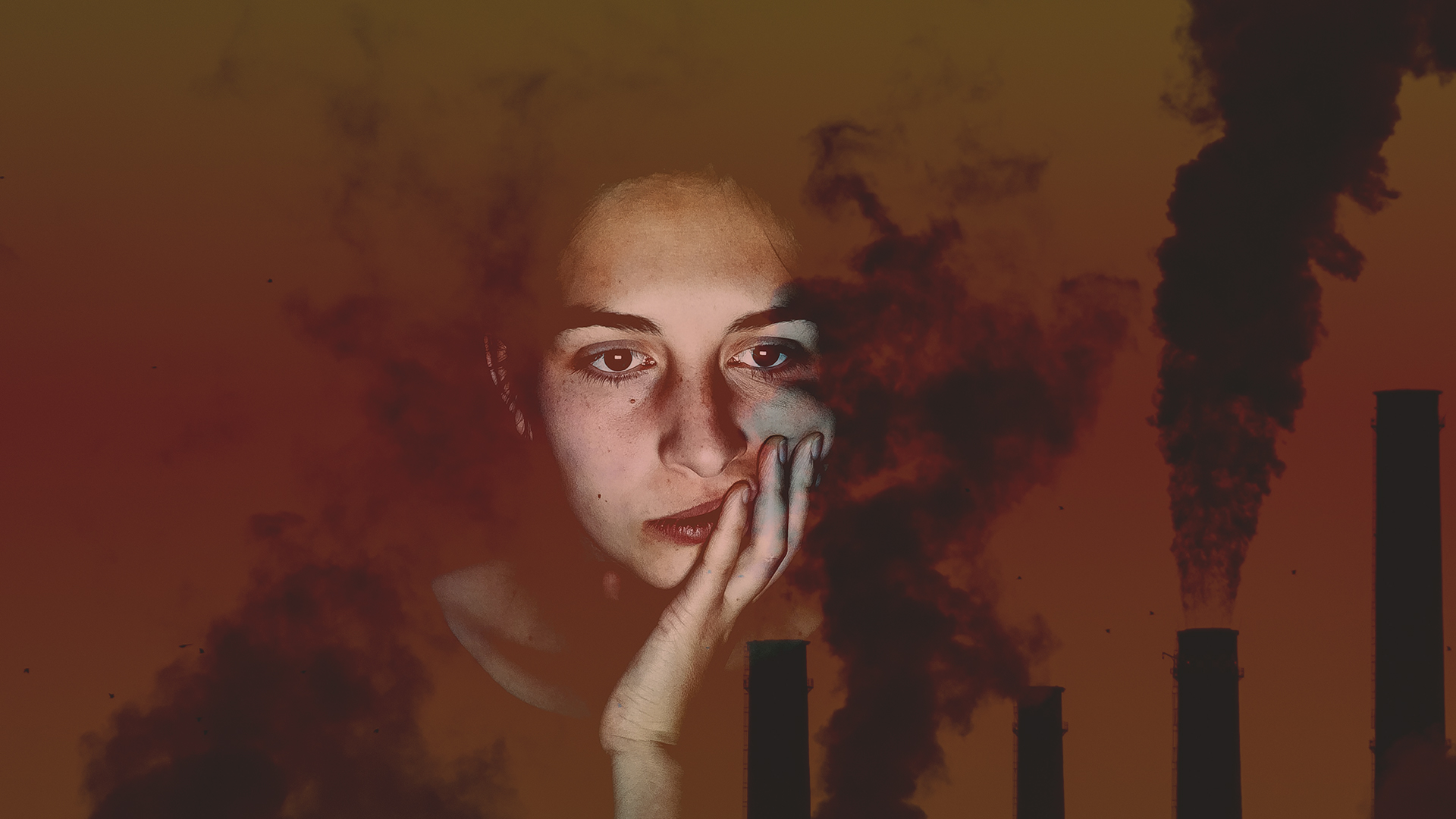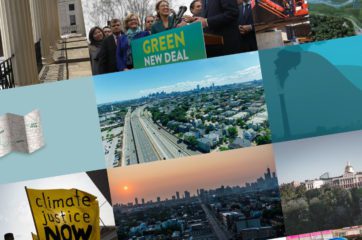As the world grapples with the devastation and destabilization of the coronavirus, as well as the waves of protests demanding justice for George Floyd and calling for an end to the systemic racism that has inflicted centuries of oppression, there has been a proliferation of literature drawing parallels between the pandemic, climate crisis, and environmental justice.
For those now simultaneously worried about COVID-19, climate change, and racial justice, the intersection of these crises may present a unique set of circumstances for individuals suffering from eco-anxiety.
What is eco-anxiety?
Eco-anxiety, also commonly referred to as climate anxiety, is the feeling of stress, grief, helplessness, and fear of uncertainty associated with the grim outlook for our climatic and ecological systems if business continues as usual. Eco-anxiety is not to be confused with clinically diagnosed anxiety disorder, but feelings of eco-anxiety can exacerbate existing mental health issues.
These are stressful times, so be mindful to take care of your physical and mental health as you are able. If you are experiencing mental distress or living with depression or anxiety, there are resources available to help. Access these COVID-19 mental health resources and information, or call the National Helpline.
Although eco-anxiety seemingly became more prevalent in 2019 as the climate movement received widespread recognition and global mobilization, psychologists have been concerned about this issue as early as 2011. The term and its legitimacy was solidified in 2017, when officials at the American Psychological Association (APA) established its official definition and described the phenomenon as a “chronic fear of environmental doom.”
Since then, eco-anxiety has woven itself into the fabric of the environmental movement, allowing individuals to now attribute a specific term to the complicated emotions they feel about the climate crisis, its intersectional impacts, and the future of our planet and ourselves. An APA poll conducted at the tailend of 2019 revealed that more than half of adults in the U.S. reported having “at least a little ‘eco-anxiety,’” and “nearly half of those aged 18-34 (47%) say the stress they feel about climate change affects their daily lives.”
More than two-thirds of adults identify as having at least a little eco-anxiety (%)
Nearly half of youth (18–34) say stress about climate change impacts their daily lives (%)
Nearly two-thirds of Americans are at least "somewhat worried" about climate change (%)
A more recent poll from the Yale Program on Climate Communications in April of 2020 revealed that “two in three Americans (66%) say they are at least ‘somewhat worried’ about global warming. One in four (26%) are ‘very worried’ about it.” While Americans grappled with the pain and anxiety from the outset of the global pandemic and its human and economic impacts, worries about climate change have remained steadfast.
It’s clear that there is an increasing concern about climate change, and as the nation plans for the road to recovery, those fears risk being exacerbated if climate is absent from the conversation.
The toll of eco-anxiety
People harboring feelings of eco-anxiety may experience different mental and physical impacts from dealing with increased stress levels and anxiety, which can sometimes worsen after climate-fueled disasters strike.
Eco-anxiety can evoke physiological responses to dealing with stress, such as sleep disorders or increased substance dependencies. The long-term impacts of eco-anxiety have yet to be studied, but chronic stress has been known to increase the likelihood of compromised immune systems and serious strains on social relationships. In the short-term, this type of stress can cause depression, anxiety, and feelings of a loss in autonomy or personal identity.
Unequal Impacts
As other world governments focus their efforts on making sustainability and climate the focal point of recovery, the U.S. has made no such notions, as the administration seeks to bail out oil and gas industries. Salvaging these industries and ignoring the opportunity for a green recovery would not only prolong ecological destruction, it would perpetuate the same environmental and social inequalities that were present prior to the pandemic. For those struggling with eco-anxiety, the potential absence of green parameters from COVID-19 recovery plans offers little hope that the two crises will be dealt with together, which may further contribute to a sense of hopelessness for the future of our planet.
We know that the climate crisis disproportionately impacts low income communities, communities of color, and Indigenous Nations. It is therefore likely that these anxieties also fall disproportionately on these and other climate frontline communities.
For Indigenous communities, feelings of eco-anxiety can be amplified as a changing climate disrupts numerous activities that hold significance to community culture. A study on climate impacts and mental health in Rigolet, a Canadian Intuit community, reports that interruptions to regular activities such as fishing, hunting, and foraging had negative impacts on individuals’ well-being. In-depth interviews with community members revealed that the disruptions led to feelings of decreased social cohesion, loss of identity, and in some cases even magnified past trauma. The results of the research indicate that “changes in climate and the resulting disruptions to land-based activities interact with the underlying determinants of mental health and simultaneously directly affect mental health through impacts.”
Unsurprisingly, demographic data related to COVID-19 deaths indicates that minority groups are also heavily and disproportionately impacted by the pandemic. According to analysis from The Washington Post, counties with majority black populations have infection rates three times higher and death rates six times higher than predominantly white counties.
Those on the receiving end of racial oppression and generational trauma have also been disproportionately overburdened by poor health. This is not only a result of dealing with the physical and mental weight of inequality and racism—whether traditional or aversive—but is also a result of structural violence, where the needs of a community aren’t being met by the institutions meant to serve them. This creates health disparities that leave racial and ethnic minority groups with higher rates of illnesses, such as heart or lung diseases, diabetes, and asthma. The stress of poorer health and healthcare, compounded by the ongoing threats from the pandemic and climate crisis, could potentially heighten already present feelings of anxiety.
Youth are impacted, too
Younger generations growing up experiencing climate change and the coronavirus pandemic will surely struggle with the lasting consequences of having these crises ingrained in their minds and memory.
A poll from The Washington Post of U.S. youth found that more than half of teens associated feelings of fear with climate change, followed by motivation, anger, and helplessness. Similarly, a survey of 2,000 youth, ages eight to 16, in the U.K. found that 73% reported being worried about the planet, and 22% reported being very worried. They also found that, despite the rise in youth climate activists, more than half believed their voices weren’t being heard in the fight for climate solutions.
Not only should we be amplifying the voices of the world’s youth, but we should be having these critical conversations about climate change. Talking about the climate and ecological crisis can be complex and confusing, but uncertainty can fuel feelings of stress so we can’t shy away.
Coping with Eco-Anxiety
While there isn’t yet data on how the pandemic is affecting feelings of eco-anxiety, it’s important to recognize the mental health toll of each crisis and its impacts on an individual’s ability to maintain a state of well-being. Although eco-anxiety is not considered a clinical condition and differs from clinically diagnosed anxiety disorder, coping with feelings of eco-anxiety can be difficult, especially when compounded by the physical and mental strain of COVID-19.
How can individuals and communities ameliorate feelings of eco-anxiety around the climate crisis in the midst of the pandemic?
“Get informed” says Dr. Susan Clayton, Psychology Department Chair at The College of Wooster and a lead author on the upcoming 6th assessment of the Intergovernmental Panel on Climate Change (IPCC) report. “Find out what the actual effects of climate change are likely to be in your area. This can be depressing, but sometimes people are catastrophizing about the end of the world and accurate information can be a relief – at least it reduces uncertainty (which contributes to climate anxiety).”
Useful resources to help keep you informed
A Global Pandemic & A Climate Crisis: Eerily Similar Impacts with Starkly Different Responses
Where the 2020 Candidates Stand on Climate Issues
Massachusetts Attorney General Highlights Link Between Environmental Justice and COVID-19
How Do We Keep Pollution Reductions After This Crisis? Invest in Climate and Public Health.
Let’s Not Trade One Public Health Crisis for Another: COVID Response Can’t Ignore Climate
Another way to help cope with eco-anxiety is to establish a renewed connection with the natural environment. “Take time to enjoy the outdoors in addition to just worrying about it. There’s plenty of evidence that time in nature can be calming and restorative,” Dr. Clayton told Climate XChange.
Those experiencing climate and eco-anxiety can also look to other people and communities for support and guidance in getting plugged into the right conversations. “Find groups who can join you in doing something, whether it be helping your community or political activism. Social connections are very important to mental health, and being involved with a group is usually fun and rewarding,” says Dr. Clayton.
Join our State Carbon Pricing Network (SCPN). It’s a network of thousands of advocates, legislators, and business leaders across the U.S. working to enact carbon pricing and climate policies in their state. Registering is free, sign up and join the movement.
An important element to overcoming feelings of grief and hopelessness is to “Get involved,” said Dr. Clayton, “Find something that you can do, but also include things you can do to make your own household more sustainable. By taking action, people feel less overwhelmed and helpless. It also encourages optimism as you think about what CAN be changed.”









